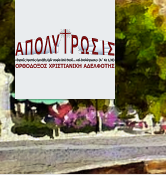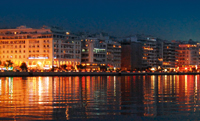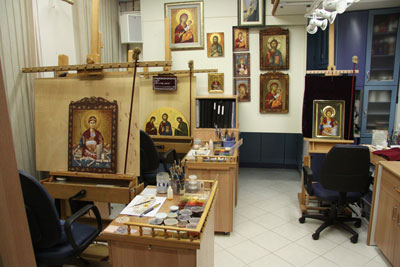 ΑΠΟΛΥΤΡΩΣΙΣ
ΧΡΙΣΤΙΑΝΙΚΗ ΟΡΘΟΔΟΞΗ ΑΔΕΛΦΟΤΗΣ
ΑΠΟΛΥΤΡΩΣΙΣ
ΧΡΙΣΤΙΑΝΙΚΗ ΟΡΘΟΔΟΞΗ ΑΔΕΛΦΟΤΗΣ
Super User
ΓΙΟΡΤΑΖΩ ΧΡΙΣΤΟΥΓΕΝΝΑ
Ἑλένης Βασιλείου
17 χριστουγεννιάτικα καί 16 πρωτοχρονιάτικα διηγήματα, σελίδες 192.
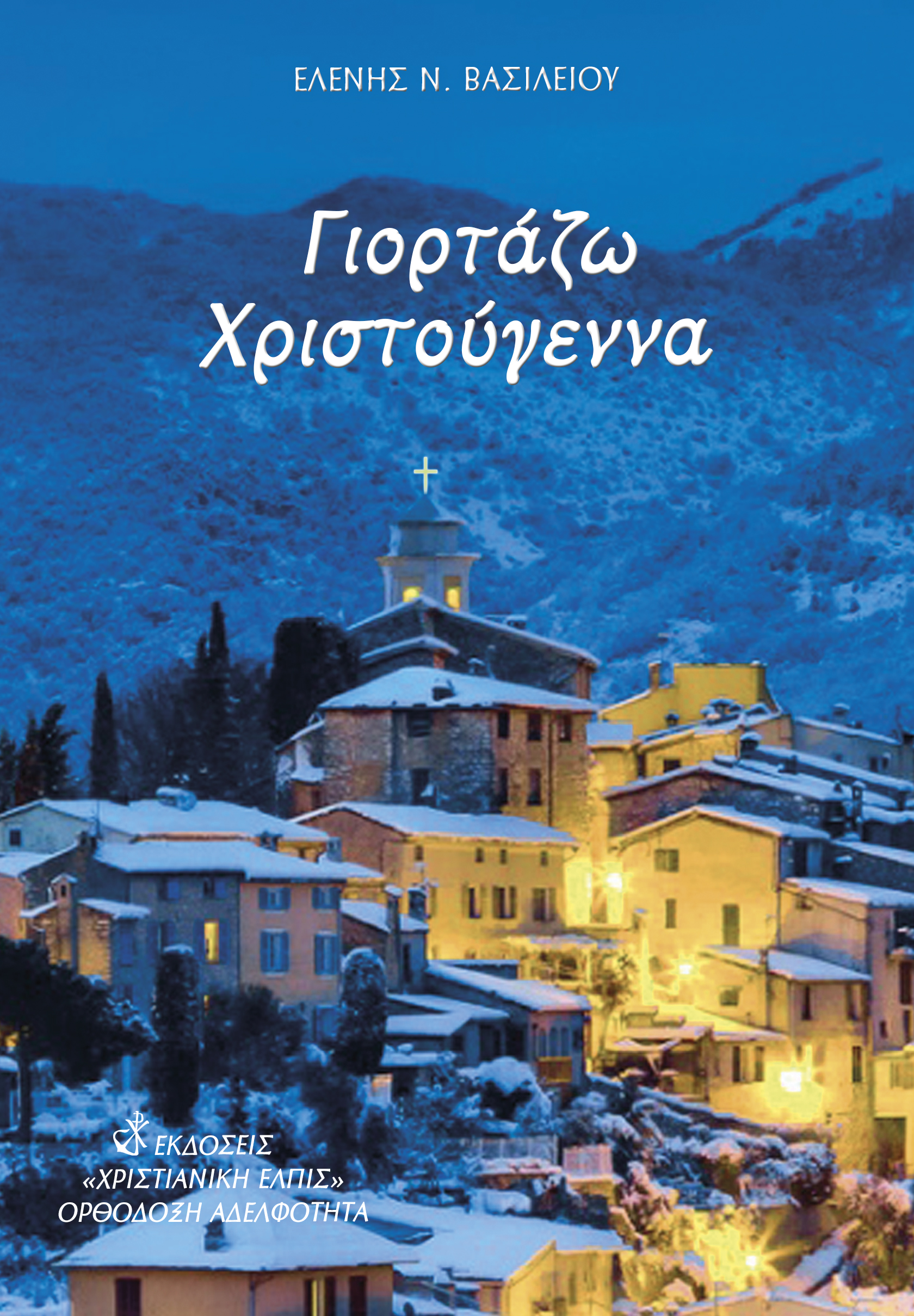
Ζητῆστε το στό Βιβλιοπωλεῖο "Ἀπολύτρωσις", τηλ. 2310 274518.
ΧΡΙΣΤΟΥΓΕΝΝΑ ΧΑΡΑ ΜΟΥ ΠΑΙΔΙΚΗ

Ἑλένης Βασιλείου
24 συναρπαστικά διηγήματα, πού προσφέρουν μία ζεστή καί τρυφερή προσέγγιση στό μεγάλο μήνυμα τῶν Χριστουγέννων.
Σελίδες 164, ἔκδοση Στ΄
ISBN 960-88866-0-0
Ζητῆστε το στό Βιβλιοπωλεῖο "Ἀπολύτρωσις", τηλ. 2310 274518.
ΘΕΑΤΡΙΚΑ ΜΗΝΥΜΑΤΑ ΤΟΜΟΣ Β΄

Σελίδες 164, ἔκδοση Α΄
ISBN 978-960-6805-13-4
b) Jesus’ Birth (Lk 2:6-7)
Translation from the book:
Στεργίου Ν. Σάκκου, Ἑρμηνεία στό κατά Λουκᾶν Εὐαγγέλιο, τόμ. Α΄,
ἐκδ. «ΧΡΙΣΤΙΑΝΙΚΗ ΕΛΠΙΣ» ΟΡΘΟΔΟΞΗ ΑΔΕΛΦΟΤΗΤΑ, Θεσ/νίκη 2008, σσ. 96-99
(Stergios N. Sakkos [Read CV], A Commentary on the Gospel according to St. Luke, vol. A', pp. 96-99)
2,6-7. Ἐγένετο δὲ ἐν τῷ εἶναι αὐτοὺς ἐκεῖ ἐπλήσθησαν αἱ ἡμέραι τοῦ τεκεῖν αὐτήν, καὶ ἔτεκε τὸν υἱὸν αὐτῆς τὸν πρωτότοκον, καὶ ἐσπαργάνωσεν αὐτὸν καὶ ἀνέκλινεν αὐτὸν ἐν τῇ φάτνῃ, διότι οὐκ ἦν αὐτοῖς τόπος ἐν τῷ καταλύματι.
2:6-7 But while they were there, the time came for her to deliver and she gave birth to her first-born son, and wrapped Him in swaddling clothes, and laid Him in a manger, because there was no place for them in the inn.
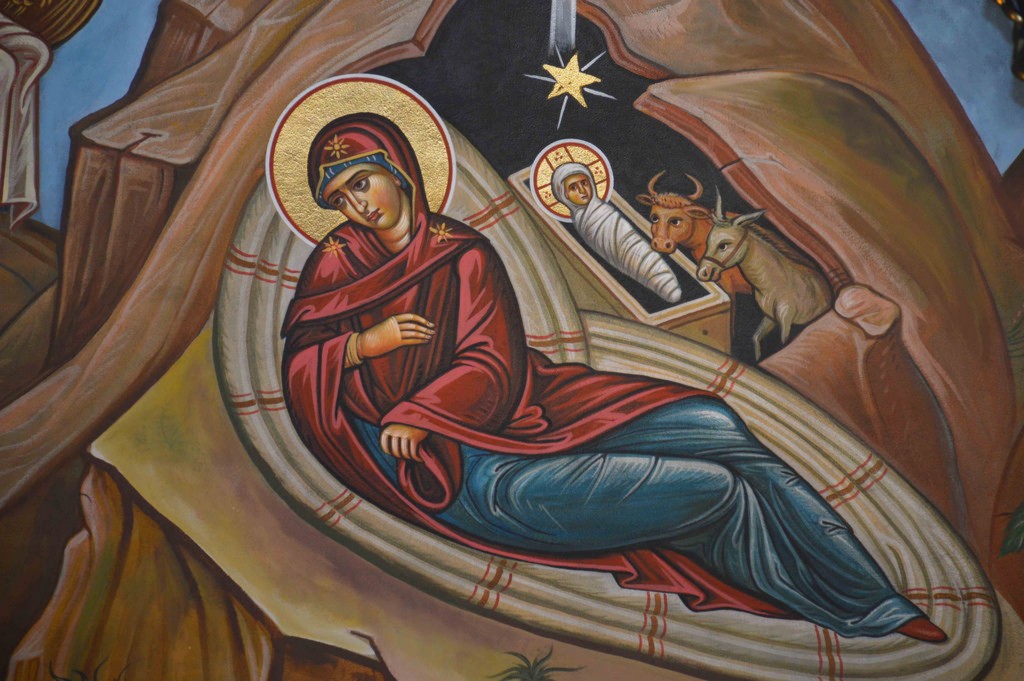 When Joseph and the virgin Mary arrived at Bethlehem to take the census, “the time came for her to deliver” the days of her pregnancy were fulfilled, and she bore her firstborn son. The first son was called the firstborn, whether other children followed or not. If other boys were born after him, he was distinguished from them by the term 'elder'.
When Joseph and the virgin Mary arrived at Bethlehem to take the census, “the time came for her to deliver” the days of her pregnancy were fulfilled, and she bore her firstborn son. The first son was called the firstborn, whether other children followed or not. If other boys were born after him, he was distinguished from them by the term 'elder'.
Evangelist Luke, with unparalleled simplicity and in few words, tells the story of Jesus’ birth. This style of writing, which the other evangelists also follow, is in perfect contrast to the false gospels, the so-called apocryphal writings. The greatest proof of the reliability of the Gospels is the total lack of exaggerated and detailed descriptions which characterize the various irresponsible traditions that circulated from the earliest times concerning the Lord’s life.
As soon as Jesus was born, his mother “wrapped Him in swaddling clothes, and laid Him in a manger”. She put him in a manger, in the place where they put the animal straw, because there was no other cleaner place. The Lord condescended to be born in a stable; it was perhaps the most expressive image of humanity he was coming to save.
In those days all the inns had a stable so that the animals, the transportation means of that time, could find food and rest there. The place where people could stay, was a large one without beds or even mattresses. The people crowded into large rooms and, if it was possible, they would lie down on the floor next to each other. Therefore, in the inn it was impossible to find a private corner, quiet and isolated, that would facilitate the expected childbirth. That is why Joseph and the virgin Mary preferred to spend that night at the stable.
In the Byzantine iconography of the Nativity, the stable is represented as a natural cave; this tradition is also attested to by ancient writers. In Palestine, natural caves formed on the slopes of its clay hills abound. Sometimes, with a few changes, they were transformed into inns or stables for inns and even into residences. One such cave was the stable of the inn where Joseph and Mary spent their night.
Copyright © 2021 by Orthodox Christian Association «ΧΡΙΣΤΙΑΝΙΚΗ ΕΛΠΙΣ» ΟΡΘΟΔΟΞΗ ΑΔΕΛΦΟΤΗΤΑ. Used by permission. All rights reserved.
a) The Census (Lk 2:1-5)
Translation from the book:
Στεργίου Ν. Σάκκου, Ἑρμηνεία στό κατά Λουκᾶν Εὐαγγέλιο, τόμ. Α΄,
ἐκδ. «ΧΡΙΣΤΙΑΝΙΚΗ ΕΛΠΙΣ» ΟΡΘΟΔΟΞΗ ΑΔΕΛΦΟΤΗΤΑ, Θεσ/νίκη 2008, σσ.91-96
(Stergios N. Sakkos [Read CV], A Commentary on the Gospel according to St. Luke, vol. A', pp. 91-96)
The evangelist Luke, in the second chapter of his Gospel, records certain historical events connected with the mystery of the incarnation of God’s Son. This is inexplicable to the human mind and incomprehensible to human reason. The study of these events helps us to approach the fact of the incarnation, to delve in its meaning, to reap its great gifts.
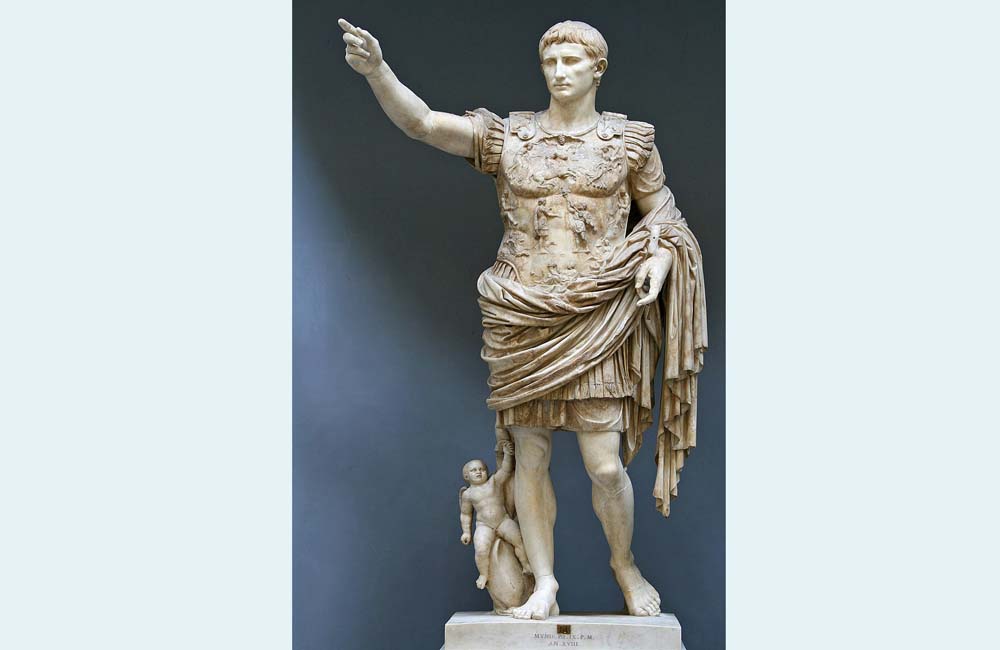 2,1. Ἐγένετο δὲ ἐν ταῖς ἡμέραις ἐκείναις ἐξῆλθε δόγμα παρὰ Καίσαρος Αὐγούστου ἀπογράφεσθαι πᾶσαν τὴν οἰκουμένην.
2,1. Ἐγένετο δὲ ἐν ταῖς ἡμέραις ἐκείναις ἐξῆλθε δόγμα παρὰ Καίσαρος Αὐγούστου ἀπογράφεσθαι πᾶσαν τὴν οἰκουμένην.
2:1 It came to pass in those days that a decree went out from Caesar Augustus that all the world should be enrolled.
In the synoptic evangelists the verb "ἐγένετο" at the beginning of a paragraph means an introduction to a new cycle of narratives, which are not connected in time and place with those that preceded it.
"The fullness of the time" (Ga 4:4) had come “in those days”. The days prescribed in Daniel’s prophecy (9:21-27) had been fulfilled. The various religions were literally bankrupt, philosophy was unable to offer redemption and political power was corrupt. There was no longer any time for postponement or waiting; the world was as much in need of salvation as ever but at the same time was as ready as ever; the world was hosting in those days the most distinguished woman of all the ages (see comments on 1:28). Moreover, after Octavian's victory over Marc Antony at Actium in September 31 BC, which marked the end of the civil wars in Rome and the beginning of the imperial period, the famous Roman peace (Pax Romana) prevailed everywhere. In this historical context, during the monarchy of Octavian (31 BC - 14 AD), God found the most suitable conditions for the realization of his plan: a unified administration, the Roman one; a suitable language, Greek; a true religion, Judaism. It is aptly chanted in the doxastic of the (stichera) verses of the Christmas Eve Vespers; “When Augustus became supreme ruler of the world, the many kingdoms among the people came to an end. Likewise, when You became Incarnate of the Immaculate One, the worship of many gods had to cease. The cities came under a universal power, and the Gentiles believed in one supreme Divinity. Nations were registered in the name of Caesar Augustus, and we, the faithful, were registered in your divine name, O Incarnate One. O Lord, great is your mercy; glory to You!”
The expression “a decree went out” means "an edict was issued". This particular decree (Latin indictio) stipulated the beginning of the census. The Romans, as an organized state, took a census every five years. When they conquered many peoples and became a vast empire, for practical reasons they tripled the interval and made it fifteen years.
The decree demanded a census of the whole world i.e., it ordered a world census. The first world censuses took place during the reign of Octavian Augustus, because he was the first monarch of the entire known world, which stretched around the Mediterranean. The Roman emperors were often titled as "rulers of the world" in inscriptions.
The name-title Caesar indicates Octavian's descent from the famous ancient Roman family known by that name. Augustus means "Respected"; it was attributed to Octavian as an exceptional title of honour and subsequently prevailed as his first name.
2,2. Αὕτη ἡ ἀπογραφὴ πρώτη ἐγένετο ἡγεμονεύοντος τῆς Συρίας Κυρηνίου.
2:2 This was the first census, when Quirinius was governor of Syria.
The Roman state was divided into large geographical divisions; Syria was one such division, which included Palestine.
The census mentioned here was taken when Sentius Saturninus was ruler of Syria. However, it was connected with the name of Quirinius, because it was under his supervision as a military ruler. The verb "ἡγεμονεύοντος" generally means any office held (cf. Lk 3:1). The census was described as the first “when Quirinius was governor of Syria”, because it was followed by a second, which Luke mentions in the book of Acts (5:37), when Quirinius had succeeded Saturninus as ruler of Syria.
2,3. Καὶ ἐπορεύοντο πάντες ἀπογράφεσθαι, ἕκαστος εἰς τὴν ἰδίαν πόλιν.
2:3 And all went to be enrolled, every one into his own city.
The imperial decree was to be obeyed by “all”, all the subjects of the Roman empire. The Roman orders were strict. Any delay or indifference received an exemplary punishment. There were no exceptions.
The Romans, in order to avoid administrative difficulties and conflicts with the sensitivity of the peoples they had conquered, took advantage of some of their customs. Thus, among the Jews, who were careful to preserve their genealogies, the census was taken by line of descent. All the Jews left the cities, where they lived, and went to take their census in their “own city”, the place of origin of their ancestors.
2,4-5. Ἀνέβη δὲ καὶ Ἰωσὴφ ἀπὸ τῆς Γαλιλαίας ἐκ πόλεως Ναζαρὲτ εἰς τὴν Ἰουδαίαν εἰς πόλιν Δαυΐδ, ἥτις καλεῖται Βηθλεέμ, διὰ τὸ εἶναι αὐτὸν ἐξ οἴκου καὶ πατριᾶς Δαυΐδ, ἀπογράψασθαι σὺν Μαριὰμ τῇ μεμνηστευμένῃ αὐτῷ γυναικί, οὔσῃ ἐγκύῳ.
2:4-5 So Joseph went up from Galilee, from the town of Nazareth, to Judaea, to David's town which is called Bethlehem, because he was of the house and lineage of David, to be enrolled together with Mary, his fiancée who was pregnant.
Joseph and the virgin Mary were among the multitude that set out for the census. They travelled from Nazareth of Galilee where they dwelt to Bethlehem of Judea, because they descended from Judah’s tribe and specifically from David’s line (cf. Lk 1:27). Bethlehem, a small pastoral district about two hours' walk from Jerusalem, is referred to as David’s city, because it was David’s birthplace (cf. 1 Sam 16:1, 18). Its name means "house of bread". It is very expressive and gives a chance for preaching about the place where the "bread of life" was offered to mankind (Jn 6:35). Divine providence took care that, on the occasion of the census, Mary and Joseph should find themselves in Bethlehem at the time of childbirth, where according to the explicit prophecy of Micah (5:1), the Messiah would be born.
Although Judea extended south of Galilee, in the Bible the verb "went up" was used for the journey from Galilee to Judea, because the latter was at a higher altitude.
For the expression "his fiancée" see comments on 1:27.
Lord’s incarnation is connected with a series of successive humiliations and persecutions. Jesus had not yet been born and was about to undergo the first humiliation, the humiliation of the census. To understand the deep meaning of this humiliation, we must be aware of the political and civil status of those days. For free peoples, the census was not simply a count of the population of a country. Its purpose was purely economic. The ancient rulers, in order to be informed about the taxes they could collect from each subject, occasionally appointed special rulers surrounded by hired people who recorded all the property and annual income of their subjects. In this way they calculated what taxes each person had to pay.
But for enslaved peoples, such as the Israelites at the time of Christ's birth, the census had a very humiliating meaning. The enslaved were considered the property of their conquerors. The sovereign ruler or emperor recorded them down, along with their houses, their fields, their animals, as objects of his personal property. However, because he could not manage all these, so he forced them to buy themselves and the members of their families, paying for each person (per head) a slave’s price and then required them to rent their own fields and animals, so that they could work with them as if they were their own. The price of their head was the so-called body tax or the head tax; the rent they paid for their land was the land tax. In addition, they paid all the taxes of the free citizens.
The census ordered by Augustus Caesar took place at the same time with Christ’s birth. The incarnated God was born as a slave, while the counting of the slaves was still going on. His first obligation in his life was to buy himself for one year. What a humiliation! While he was the king of the kings of the world, apparently Augustus held that position; and he was born as a possession and part of Augustus' property. Although Jesus was the true king of Israel as David’s son; The genuineness of his descent from David was evident from the census’ records which forced him to take his census in David’s city, Bethlehem; yet another person as a tyrant sat at the helm of Israel, Herod the Edomite. He was neither David’s son nor even an Israelite. When the true king of the world was born, Augustus recorded him as his possession, and Herod hunted him as his victim, wanting to slay him.
The fact of the Lord's census recording is particularly moving to the hymn writers of our Church. Behind the census of the Roman Empire, they see another side, a spiritual one. Through the wonderful contrasts and rich juxtapositions, the Christmas hymns approach its deeper meaning: "Nations were recorded in the name of Caesar Augustus, and we, the faithful, were registered in your divine name, O Incarnate One...". Christ, the world ruler, was recorded as Augustus’ slave, to write us down in the book of life, and even under his own name as Christians!
Miserable were those who were recorded as Caesar Augustus’ servants; blessed are those who are recorded as Jesus Christ’s servants. Wretched were those who paid body-tax to the monarch Augustus; great happiness bestowed those who were redeemed at a high price by the eternal monarch Jesus’ blood and pay him a tribute of faith through repentance and obedience to his holy will.
Copyright © 2021 by Orthodox Christian Association «ΧΡΙΣΤΙΑΝΙΚΗΕΛΠΙΣ» ΟΡΘΟΔΟΞΗ ΑΔΕΛΦΟΤΗΤΑ. Used by permission. All rights reserved.
2f. THE PRECIOUS GIFTS
The Liturgy of the Faithful
In ancient times, before Christ, the Jews offered as sacrifices “the first-fruits” at the sacrificial altars which they had built for God’s worship. They sacrificed the first and the best born sheep, calves and crops of the earth. We Christians following Christ’s commandment, offer bread and wine. These are given by God but man’s cooperation is essential. The basis for the bread is the wheat but man plants, harvests, makes flour and bakes it. The same is true for the wine as grapes must be gathered and then the juice of them will become wine.
God, who gives us the bread and wine, commands us to offer them as gifts. He is the provider and law-giver and is ready instead of these to give us his spiritual, infinitely superior gifts. He promised to the rich man, whom he invited to sell his possessions and give his money to the poor, that he would give him spiritual riches, the kingdom of Heaven. The rich man would have given gravel and would have received diamonds. To the Apostles, whom he called to leave their jobs, he promised that instead of fishing for fish in the lake, they would become fishers of men. In the Divine Liturgy in order to receive the real, the everlasting, the living, the heavenly bread, which is Christ Himself, we offer earthly bread.
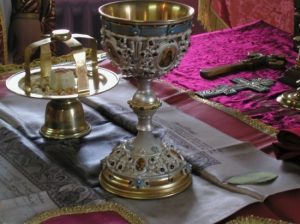 The bread and wine which are on the holy prothesis are not yet sanctified, they have not yet changed into the Body and Blood of Christ. They are going to be transferred during the Great Entrance to the holy altar where the great miracle will take place.
The bread and wine which are on the holy prothesis are not yet sanctified, they have not yet changed into the Body and Blood of Christ. They are going to be transferred during the Great Entrance to the holy altar where the great miracle will take place.
For our salvation, our own collaboration is also required. God wants us to be saved and offers everything for our salvation. Provided we also desire it and make every effort towards it. This is the least we can do.
THE GREAT MERCY
2e. THE GREAT MERCY
The (51st) 50th psalm is the famous psalm of repentance. It is a collection of 21 verses. Each verse is like a diamond. The first one starts: “Have mercy upon me, O God, according to your great mercy and according unto the multitude of your compassions blot out my transgressions”.
The person who is asking for help here is the most glorious King of Israel. But in the first verse he appears as a poor beggar. People are indeed unhappy and live in a void in spite the astonishing progress in the technical and scientific fields. They suffer and groan even if they live in a wealth. The machines they invented to make life easier and happier, made them their slaves. This kind of civilization has not liberated people from passions and evils but added an oppressive weight. They feel the need of deliverance from the internal slavery of the passions and from the external slavery of the modern world.
The poet asks God’s mercy. But a distinction is made between small and great mercy. Small mercy concerns all the earthly goods which the omnipotent God gives us. For example, the rain which falls and moistens the fields and makes the earth bloom. The air which the whole planet and all mankind breathes. The rays of the sun which illuminate and warm the earth. These three blessings and many more are given freely to all people without exception. As Christ says, the heavenly Father: “makes his sun to rise on the evil and on the good, and sends rain on the just and on the unjust.” (Mt 5:45) Therefore, God is merciful to all of us, even to those who receive all the blessings of divine creation but do not feel the need to express their gratitude to God.
My God! David, the repentant sinner, cries out. I feel my guilt. I see the deep corruption of my heart. My parents are sinful because they are descendants of Adam and Eve. From the first couple originates the inclination and tendency towards sin. I do not want to sin. But my will is very weak. I fall into sin. However, I am not senseless and indifferent. A voice, like a spark, inside me does not stop censuring me as an offender of the divine law. I have nothing to offer you but a pitiful and unclean heart. O Lord, I ask for your great mercy.
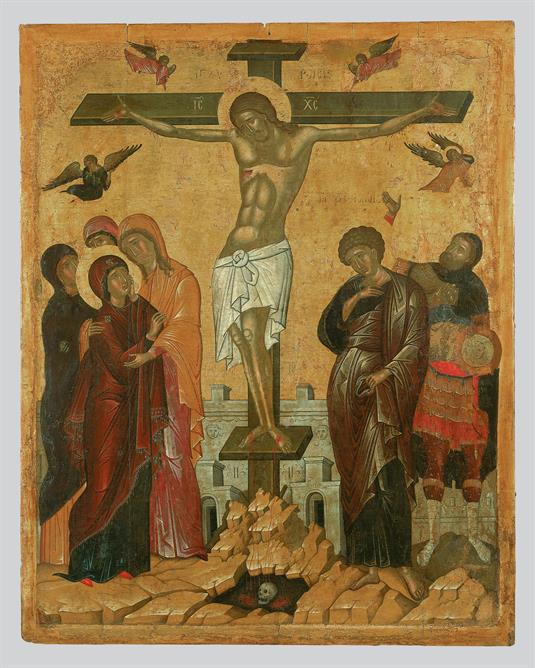 This great mercy is the forgiveness of sins. It derives only through Christ’s sacrifice on the cross. Christ’s Blood is the endless ocean of God’s mercy and compassion. He washes, cleans and regenerates the sinner. “Have courage, my son. Your sins are forgiven” (Mt 9:2). This is the answer of heaven to the sinner, who by having a broken and repentant heart falls down and worships the Redeemer of the world, saying this prayer of repentance: “Have mercy on me, O God ...”.
This great mercy is the forgiveness of sins. It derives only through Christ’s sacrifice on the cross. Christ’s Blood is the endless ocean of God’s mercy and compassion. He washes, cleans and regenerates the sinner. “Have courage, my son. Your sins are forgiven” (Mt 9:2). This is the answer of heaven to the sinner, who by having a broken and repentant heart falls down and worships the Redeemer of the world, saying this prayer of repentance: “Have mercy on me, O God ...”.
e) Forerunner’s Birth and Circumcision; Zechariah’s Ode (Lk 1:57-80)
Translation from the book:
Στεργίου Ν. Σάκκου, Ἑρμηνεία στό κατά Λουκᾶν Εὐαγγέλιο, τόμ. Α΄,
ἐκδ. «ΧΡΙΣΤΙΑΝΙΚΗ ΕΛΠΙΣ» ΟΡΘΟΔΟΞΗ ΑΔΕΛΦΟΤΗΤΑ, Θεσ/νίκη 2008, σσ.74-87
(Stergios N. Sakkos [Read CV], A Commentary on the Gospel according to St. Luke, vol. A', pp. 74-87)
1,57-58. Τῇ δὲ Ἐλισάβετ ἐπλήσθη ὁ χρόνος τοῦ τεκεῖν αὐτήν, καὶ ἐγέννησεν υἱόν. Καὶ ἤκουσαν οἱ περίοικοι καὶ οἱ συγγενεῖς αὐτῆς ὅτι ἐμεγάλυνε Κύριος τὸ ἔλεος αὐτοῦ μετ᾿ αὐτῆς, καὶ συνέχαιρον αὐτῇ.
1:57-58 When it was time for Elizabeth to have her baby, she gave birth to a son. Her neighbors and relatives heard that the Lord had shown her great mercy, and they shared her joy.
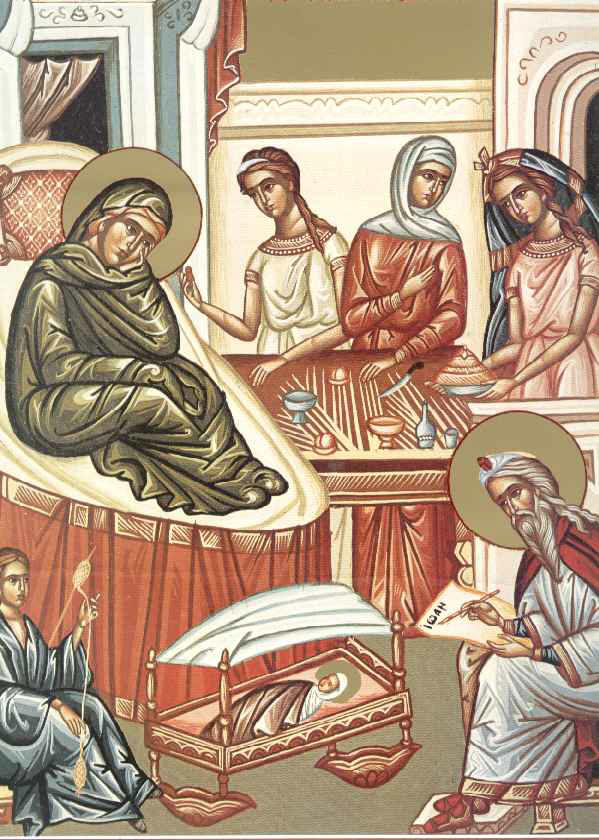 When “it was time”, that is, the required nine months were fulfilled, Elizabeth gave birth to a son. The expression “the Lord had shown her great mercy” means that the Lord showed her his magnitude of mercy (cf. Ps 56:11) because He made her worthy, while she was sterile and even in an old age, of becoming a mother.
When “it was time”, that is, the required nine months were fulfilled, Elizabeth gave birth to a son. The expression “the Lord had shown her great mercy” means that the Lord showed her his magnitude of mercy (cf. Ps 56:11) because He made her worthy, while she was sterile and even in an old age, of becoming a mother.
Elizabeth's neighbors and relatives “shared her joy” as soon as they heard the news. The pre-announcement of the Angel had already begun to be fulfilled; many were happy with the birth of this child (see verse 14).
1,59. Καὶ ἐγένετο ἐν τῇ ὀγδόῃ ἡμέρᾳ ἦλθον περιτεμεῖν τὸ παιδίον, καὶ ἐκάλουν αὐτὸ ἐπὶ τῷ ὀνόματι τοῦ πατρὸς αὐτοῦ Ζαχαρίαν.
1:59 On the eighth day they came to circumcise the child, and they were going to name him after his father Zechariah.
Jews circumcised every male child eight days after his birth, as required by law (see Gen 17:12, Lev 12:3). The naming took place at the same time. The circumcision of the child was done either by the father (see Gen 17:23) or another person, even a woman (see Ex 4:25), but always by a Jew and never by a heathen.
The newborn child was given the name of his grandfather or father or some other relative. Since in this case the father was deaf and dumb, those present wanted to make him happy by calling his child Zechariah well before his naming. Of course, they would also wait for the mother's consent.
1,60. Καὶ ἀποκριθεῖσα ἡ μήτηρ αὐτοῦ εἶπεν· οὐχί, ἀλλὰ κληθήσεται Ἰωάννης.
1:60 But his mother spoke up and said, “No! He is to be called John”.
Elizabeth responded that the child was to be named John. Apparently, she was informed of the child's name by revelation from the Holy Spirit and spoke like a prophet. If Zechariah had written it to her, they would not need to ask him again (see verse 62). After all, Elizabeth's knowledge, by divine revelation, aroused the surprise and admiration of neighbors and relatives (see verse 63).
1,61-62. Καὶ εἶπον πρὸς αὐτὴν ὅτι οὐδείς ἐστιν ἐν τῇ συγγενείᾳ σου ὃς καλεῖται τῷ ὀνόματι τούτῳ· ἐνένευον δὲ τῷ πατρὶ αὐτοῦ τὸ τί ἂν θέλοι καλεῖσθαι αὐτόν.
1:61-62 They said to her, “There is no one among your relatives who has that name.” Then they made signs to his father, to find out what he would like to name the child.
Those present were puzzled by the choice of this name answered that there was no one among Elizabeth's relatives with that name. Perhaps they feared that Elizabeth, taking advantage of Zechariah’s muteness, wanted to give the child a name of her choice.
Then they signed gestures to Zechariah what name he would like to give the child. The question “what he would like to name the child” is a typical expression, roughly analogous to the phrase: "Godfather, give the name".
1,63. Καὶ αἰτήσας πινακίδιον ἔγραψε λέγων· Ἰωάννης ἐστὶ τὸ ὄνομα αὐτοῦ· καὶ ἐθαύμασαν πάντες.
1:63 He asked for a writing tablet, and to everyone’s astonishment he wrote, “His name is John.”
A “writing tablet” refers to a square or rectangular wooden tablet they used to write on at that time. It was smeared with wax and letters were engraved on it with a small sharp rod made of iron, copper or ivory, called stylus.
The expression “ἔγραψε λέγων” is a Hebrew expression and is translated “he wrote with these words”. So, Zechariah asked for a small writing tablet and wrote the following: “His name is John.” He didn’t say “I want him to be named John”, but “His name is John”, because this name had been already given to him by the angel (see verse 13).
Neighbors and relatives “to everyone’s astonishment” wondered how Zacharias and Elizabeth had agreed to choose the name without prior arrangement.
1,64. Ἀνεῴχθη δὲ τὸ στόμα αὐτοῦ παραχρῆμα καὶ ἡ γλῶσσα αὐτοῦ, καὶ ἐλάλει εὐλογῶν τὸν Θεόν.
1:64 Immediately his mouth was opened and his tongue set free, and he began to speak, praising God.
Zechariah's muteness was the consequence of the punishment imposed on him by the Angel because he did not believe in him (see verse 20). Thus, when, obeying the divine command, he wrote the name of the child, the punishment was resolved and his tongue was immediately set free, as well.
As soon as Zechariah was able to speak, “he began to speak, praising God” he burst out in praise and thanksgiving to God, as seen in the hymn he composed (see verses 68-79). Praise is a form of prayer very pleasing to God. When prayer does not begin and end with personal requests and supplications, it is a sign of a grateful heart. Everything that refers exclusively to the Lord, such as praise, should precede requests.
1,65. Καὶ ἐγένετο ἐπὶ πάντας φόβος τοὺς περιοικοῦντας αὐτούς, καὶ ἐν ὅλῃ τῇ ὀρεινῇ τῆς Ἰουδαίας διελαλεῖτο πάντα τὰ ῥήματα ταῦτα.
1:65 All the neighbors were filled with awe, and throughout the hill country of Judea people were talking about all these things.
People who lived nearby were filled with awe once they were informed of what had happened at Zechariah's house. They were shocked by the way the child was named, by the fact that Zechariah began to speak again, but also by the narration of the heavenly apparition and the angel’s prophecy about John. With all these amazing events they felt the presence of God very close to them and the desire and expectation of the Messiah began to rekindle in them.
These great events, of course, spread throughout the mountainous region of Judea “throughout the hill country of Judea people were talking about all these things”. The word "ῥήμα" in the Holy Bible certainly means “saying” but mainly refers to the event which is the subject of.
1,66. καὶ ἔθεντο πάντες οἱ ἀκούσαντες ἐν τῇ καρδίᾳ αὐτῶν λέγοντες· τί ἄρα τὸ παιδίον τοῦτο ἔσται; Καὶ χεὶρ Κυρίου ἦν μετ᾿ αὐτοῦ.
1:66 Everyone who heard these treasured them in their hearts asking, “What then is this child going to be?” For the Lord’s hand was with him.
It was not possible to be indifferent to what had happened. Everyone put these phrases in their hearts; “Everyone who heard these treasured them in their hearts” they kept them alive in their memory. It was also reasonable to wonder: what is going to become of Zechariah's son?
The expression “Lord’s hand” signifies God’s power and energy. This power is punitive for sinners and helpful to the righteous. Here, of course, it is used in the latter meaning, that the divine power protected the infant.
1,67. Καὶ Ζαχαρίας ὁ πατὴρ αὐτοῦ ἐπλήσθη Πνεύματος ἁγίου καὶ προεφήτευσε λέγων.
1:67 And his father Zechariah was filled with the Holy Spirit, and prophesied, saying.
Zechariah “was filled with the Holy Spirit” (see comments on v. 15). God completely forgave his lack of faith and now uses his mouth as an instrument of the Holy Spirit. His ode, which begins in the next verse, is praise and prophecy at the same time. He praised God for the great blessings he bestowed upon his people, prophesied of the approaching Messiah and of John's mission. (For Hebrew poetry see comments on v. 46).
1,68. Εὐλογητὸς Κύριος, ὁ Θεὸς τοῦ Ἰσραήλ, ὅτι ἐπεσκέψατο καὶ ἐποίησε λύτρωσιν τῷ λαῷ αὐτοῦ.
1:68 Blessed be the Lord, the God of Israel, for he has visited and redeemed his people.
Zechariah belonged to the blessed remnant of Israel, the "λειμμα" (Rom 11:5), which awaited the fulfillment of the covenant which God had made with His chosen people. He saw, therefore, that the time had come for God to fulfill His promises, as he visits his people and grants them redemption. That is why he burst into a hymn full of multitude emotions and theological meanings. Its theme is the condition of fallen humanity and its elevation by the Messiah, in whose presence the great mercy of the Most High is revealed. The hymn is divided into four stanzas with the following content:
(a) Praise (v. 68a)
(b) The cause of praise (vv. 68b-69)
(c) God's promises to the fathers (vv. 70-75)
(d) John as the instrument of God's ministry for the work-purpose of salvation (vv. 76-79).
The expression "blessed be the Lord" is very common in the Bible and mainly in the Psalms. The adjective 'blessed' is attributed only to God - with few exceptions (cf. Deut 7:14; Ruth 2:20) - because only he is absolutely blessed; to him alone belongs all praise, to him belongs all glory, honour and worship. Man as a recipient of God's blessings is characterized as blessed (see v. 28).
“The Lord, the God of Israel” means "Yahweh is the God of Israel." For the expression “Lord God” see comments on v. 16.
In his prophetic hymn Zechariah used the past tense, but not as a prophetic past tense (see comments on vv. 51-53). Enlightened by the Holy Spirit, he revealed how God had already visited him and at this moment is hosted in the holiest on earth; he rests in the womb of the Virgin. God's visit is called incarnation and it bestowed the redemption, the liberation from the slavery of sin, corruption and death (cf. Tit 2:14). God's visit is like, we might say, the visit of a doctor who offers the sick person the perfect cure, the visit of a victorious king who frees his people from an oppressive captivity.
By “his people” Israel is meant undoubtedly. Yahweh was their God and he made a covenant with them. To this “people” all the prophecies about the Messiah’s coming were given. Yet this Israel was the type of the new Israel, that is, the Church; to which Zechariah here referred to prophetically, as Gabriel and the Virgin had done before him (cf. 1:16. 54).
Moreover, in the Old Testament it is clearly shown that the Messiah was not only the hope of Israel but also the expectation of the Gentiles. In the apostolic council god-brother James, bishop of Jerusalem, reminded this; “Simeon has reported how God first visited the Gentiles, to take out of them a people for his name”. And the words of the prophets agree with this" (Acts 15:14-15). In New Testament times, indeed, Gentile Christians appear to be included in the new Israel, too. These are the 'true Israelites', as St. Theophylact calls them. They are linked to patriarch Abraham not in flesh but in spirit, since they have his faith. The apostle Paul proclaimed this powerfully in his Epistles (see Rom ch. 4, Gal ch. 3).
The Lord's command to his apostles, after the resurrection, was clear: "Go and teach all nations" (Mt 28:19). The Church, the new Israel (cf. Lk 1:33, 55), the offspring of the cross and Lord’s resurrection, is ecumenical. Redemption embraces all nations.
1,69. καὶ ἤγειρε κέρας σωτηρίας ἡμῖν ἐν τῷ οἴκῳ Δαυῒδ τοῦ παιδὸς αὐτοῦ.
1:69 And has raised up a horn of salvation for us in the house of his servant David.
The “horn” denotes power, for all horned animals have their power in the horns. It is also a symbol of kingship, for in ancient Israel the anointing of the king was done with oil, which was kept in a vessel shaped like a horn. Jesus Christ, the "King of kings and Lord of lords" (1 Tim 6:15) raised up an unshakeable throne, created a mighty kingdom of salvation, his Church, of which he himself said: "and the gates of hell shall not prevail against it" (Mt 16:18).
It was known to the Jews that the Messiah would come from the chosen house of David, from the royal line of David (cf. v. 32). David in this verse is called God’s “παις” (cf. Ps (69:17) 68:18; (86:16) 85:16; Acts 4:25), that is, a servant of God, because of his great faith and piety.
1,70. καθὼς ἐλάλησε διὰ στόματος τῶν ἁγίων, τῶν ἀπ᾿ αἰῶνος προφητῶν αὐτοῦ.
1:70 As he spoke by the mouth of his holy prophets, which have been since the world began.
The prophets are called saints not only as dedicated to God’s ministry but also as his instruments. God used their mouths as a loudspeaker to announce his promises (cf. Heb 1:1; 1 Pet 1:10-12). That is why we often read in the prophetic books, phrases such as "the mouth of the Lord has spoken these things" (Is 1:20), "this is what the Lord says" (Jer 2:2), "listen to the word of the Lord" (Jer (28,7) 35:7).
The promises of course that God made to his prophets were fulfilled after centuries. This passage of centuries, however, proved God's trustworthiness and the faithfulness of the people who lived in hope of their fulfilment. The expectation of the Messiah in pre-Christian times characterized the remnant of Israel, God's chosen. Today the expectation of Christ's Second Coming characterizes his little flock, the Church. The faithful, knowing the fulfillment of all the promises given by God in the Old Testament, await the Lord’s Second Coming with steadfast faith, living hope and vigilance in the spiritual battle.
1,71. σωτηρίαν ἐξ ἐχθρῶν ἡμῶν καὶ ἐκ χειρὸς πάντων τῶν μισούντων ἡμᾶς.
1:71 That we should be saved from our enemies, and from the hand of all that hate us.
Enemies are the conquerors who seek the enslavement of God's people; “all that hate us” are the Gentiles who do not believe in the true God and therefore hate his chosen people. In the Psalms it is often said that God saves his people from those who hate them and are their enemies; "I will crush his foes before him, and I strike down those who hate him" (Ps [89:23] 88:24).
In this passage the fathers foresee the three great enemies of man - the flesh, the world and the devil - as well as all the general visible and invisible enemies who hate God's people and are hostile to the Church.
1,72. ποιῆσαι ἔλεος μετὰ τῶν πατέρων ἡμῶν καὶ μνησθῆναι διαθήκης ἁγίας αὐτοῦ.
1:72 To perform the mercy promised to our fathers, and to remember his holy covenant.
“To perform the mercy promised to our fathers” refers to the fulfillment of God's promises. St. Theophylact explains that the forefathers "all the things they expected, they saw that were fulfilled in Christ". They felt God’s mercy poured out upon them as they shared in the joy of their children, who were enjoying the benefits of the Lord's coming. Moreover, they themselves experienced his visit during his descent into hell.
“Remembrance of the covenant” means that God proves that he has not forgotten the covenant with his people (see comments on v. 54). Zigabenus interprets "For he calls the promise a covenant, and the remembrance of it a fulfillment".
The covenant is called “holy” for the following reasons:
(a) It is between the holy God and his people.
(b) Its content is holy.
(c) It is holy in its purpose; it aims to the sanctification of God's people.
1,73. ὅρκον ὃν ὤμοσε πρὸς Ἀβραὰμ τὸν πατέρα ἡμῶν.
1:73 The oath which he swore to our father Abraham.
God’s oath to Abraham is mentioned in the book of Genesis; "I will bless you, and I will multiply your seed" (22:17). Indeed, through the adoption of all the nations who embraced his faith, Abraham's descendants became an innumerable multitude (see comments on v. 68).
Of all God’s Commandments in the Old Testament, some were temporary - the ritual part, for example, concerning the formalities for the sacrifices - while others were eternal and irrevocable. For those which were eternal God made an oath, because he wanted to emphasize that his decision was irrevocable (see Heb 6:17). God's oath is an additional word to his first word; the second "yes", which certifies a truth with certainty (see Mt 5:37).
1,74-75. τοῦ δοῦναι ἡμῖν ἀφόβως, ἐκ χειρὸς τῶν ἐχθρῶν ἡμῶν ῥυσθέντας, λατρεύειν αὐτῷ ἐν ὁσιότητι καὶ δικαιοσύνῃ ἐνώπιον αὐτοῦ πάσας τὰς ἡμέρας τῆς ζωῆς ἡμῶν.
1:74-75 That he would grant unto us, that we being delivered out of the hand of our enemies, might worship him without fear. In holiness and righteousness before him, all the days of our life.
God promised to secure a deliverance for his people from their enemies and an unhindered worship of God. When Zechariah was referring to salvation from the hands of enemies, as a Jew probably envisioned the ousting of the Roman yoke, the deep expectation of the Jewish people. In reality, however, this prophecy refers to deliverance from the bondage of sin and the establishment of spiritual and continuous worship. Release from sin essentially ensures, even in adverse external circumstances, the fearless and free worship of God in which God is pleased by two characteristics:
(a) Holiness, piety and
(b) righteousness, virtue.
St. Theophylact explains: "Holiness is the piety one shows towards God; and righteousness towards men".
1,76. Καὶ σύ, παιδίον, προφήτης ὑψίστου κληθήσῃ· προπορεύσῃ γὰρ πρὸ προσώπου Κυρίου ἑτοιμάσαι ὁδοὺς αὐτοῦ.
1:76 And you, child, shall be called the prophet of the Most High: for you shall go before the face of the Lord to prepare his ways.
Zechariah now turns to his son and prophesies about the work and the importance of his mission; John will become a prophet, Messiah’s forerunner (cf. Mal 3:1; Is 40:3; Lk 1:17).
The plural 'ways' refers to the paths which John will indicate to those who will approach him in order to find the way of salvation (see Lk 3:10-14).
1,77. τοῦ δοῦναι γνῶσιν σωτηρίας τῷ λαῷ αὐτοῦ, ἐν ἀφέσει ἁμαρτιῶν αὐτῶν.
1:77 To give knowledge of salvation unto his people by the remission of their sins.
The Jews expected the salvation that the Messiah would bring as deliverance from the conquerors (cf. vv. 74-75). Zechariah, enlightened by the Holy Spirit, prophesied that John would offer the people a knowledge of salvation, which God gives by bestowing remission of sins. In this way he presented the true dimensions of the Messiah’s work, overturning the messianic hopes, as all the Israelites and himself had understood them to be up to that time.
1,78. διὰ σπλάγχνα ἐλέους Θεοῦ ἡμῶν, ἐν οἷς ἐπεσκέψατο ἡμᾶς ἀνατολὴ ἐξ ὕψους.
1:78 Through the tender mercy of our God, through which the sunrise from on high has visited us.
“Σπλάγχνα” are the sensitive internal organs of men; the heart, the liver, the kidneys. They were considered the “seat of compassion”, affection, love. “Σπλάγχνα of our merciful God” is God's great sympathy for man. We certainly owe his visit and the donation of salvation to this and not to our own works.
The prophets foretold that the Messiah would come as the light of the world (see Is 9:2; 42:6-7; 60:1-2; cf. Mt 4:16), as the "sun of righteousness" (Mal 4:2), as the "sunrise" (Zech 6:12). It was known from the book of Numbers that a "star would rise from Jacob" (24:17). John the Baptist’s father announced that the time had come for the Messiah to visit the earth from above. The Church chants the event of the Lord’s incarnation in the Christmas apolytikion, testifying her experience, using the language of the prophets: Your Nativity, O Christ our God, has shined the light of knowledge upon the world; for thereby they that worshipped the stars were instructed by a star to worship You, the Sun of Righteousness, and to know You, the Dayspring from on high. O Lord, glory be to You.
1,79. ἐπιφᾶναι τοῖς ἐν σκότει καὶ σκιᾷ θανάτου καθημένοις, τοῦ κατευθῦναι τοὺς πόδας ἡμῶν εἰς ὁδὸν εἰρήνης.
1:79 To give light to them that sit in darkness and in the shadow of death, to guide our feet into the way of peace.
Zechariah proclaimed that God’s visit is different from all his previous appearances in Israel's history, because it will be so evident. It will dispel all spiritual darkness and shadows of death, just as the sunrise dispels darkness, which hides dangers and sometimes the threat of death. It will also illuminate the path of men, so that they may be directed to the way of peace, the way that leads to reconciliation with God (cf. Ro 5,1), towards salvation.
1,80. Τὸ δὲ παιδίον ηὔξανε καὶ ἐκραταιοῦτο πνεύματι, καὶ ἦν ἐν ταῖς ἐρήμοις ἕως ἡμέρας ἀναδείξεως αὐτοῦ πρὸς τὸν Ἰσραήλ.
1:80 And the child grew, and became strong in spirit, and was in the deserts until the day of his revelation to Israel.
The expression "the child grew and became strong in spirit" means the physical growth and spiritual maturity that a child shows as it grows up.
The events of John's childhood are omitted. We are informed only that he was “in the deserts”, that is, at some point he departed to the desert of Judea. In silence and isolation, he prepared himself for his great mission as a Baptist who was coming prior to the presence of the Messiah.
John wandered in various parts of the desert, as the plural “in the deserts” shows. His stay there was prolonged until the day of his revelation to Israel, until the time he received God’s message (see Lk 3:2) to appear to the people of Israel and carry out his mission. This message was probably given to him when he was 30 years old -six months before Christ's baptism- when he reached the age required to begin his public ministry.
Copyright © 2021 by Orthodox Christian Association «ΧΡΙΣΤΙΑΝΙΚΗ ΕΛΠΙΣ» ΟΡΘΟΔΟΞΗ ΑΔΕΛΦΟΤΗΤΑ. Used by permission. All rights reserved.
Βοήθημα Προκατηχητικοῦ Β΄

ΜΑΘΑΙΝΩ ΓΙΑ ΤΟΝ ΘΕΟ
ΣΤΗ ΣΚΕΠΗ ΤΩΝ ΑΓΙΩΝ
Βοήθημα Προκατηχητικοῦ, τόμ. Β΄.
Τριάντα μαθήματα μέ διηγήσεις ἀπό τήν ἁγία Γραφή καί τό Συναξάρι τῆς Ἐκκλησίας, καθώς καί ἁπλές διδακτικές ἱστορίες ἀπό τήν καθημερινή ζωή.
Τό Βοήθημα συνοδεύεται καί ἀπό CD μέ ἐποπτικό ὑλικό (εἰκόνες, ζωγραφιές, σχεδιαγράμματα, προβολές, παιχνίδια, κατασκευές).
Ζητῆστε το στό Βιβλιοπωλεῖο μας "Ἀπολύτρωσις", Γ. Μπακατσέλου 5, Θεσ/νίκη
τηλ. 2310 274518
d) Virgin Mary᾿s Meeting with Elizabeth; Virgin's Ode (Lk 1:39-56)
Translation from the book:
Στεργίου Ν. Σάκκου, Ἑρμηνεία στό κατά Λουκᾶν Εὐαγγέλιο, τόμ. Α΄,
ἐκδ. «ΧΡΙΣΤΙΑΝΙΚΗ ΕΛΠΙΣ» ΟΡΘΟΔΟΞΗ ΑΔΕΛΦΟΤΗΤΑ, Θεσ/νίκη 2008, σσ. 62-74
(Stergios N. Sakkos [Read CV], A Commentary on the Gospel according to St. Luke, vol. A', pp. 62-74)
During the Annunciation the angel informed the Virgin that her relative, Elizabeth, was pregnant. Young Mary perceived this information as an indirect encouragement and decided to visit Elizabeth. The Holy Spirit urged her to make this visit, so that after what happened there, her faith would grow even stronger.
1,39. Ἀναστᾶσα δὲ Μαριὰμ ἐν ταῖς ἡμέραις ταύταις ἐπορεύθη εἰς τὴν ὀρεινὴν μετὰ σπουδῆς εἰς πόλιν Ἰούδα.
1:39 And Mary rose up in those days and went into the hill country in haste, to a town of Juda.
“In haste”, means urgently. This is how Mary left Nazareth, which was in the south of Galilee, and went to a town in the mountainous Judea. She attempted to make such a long, tiring journey not only for a girl but for men as well. She probably followed a group of fellow travelers, friends or relatives. Maybe it was during Passover, as it is supported by many Church Fathers, when all Israelis travelled to Jerusalem. Therefore, virgin Mary did not have any difficulty in finding fellow travelers for her journey.
1,40-41. καὶ εἰσῆλθεν εἰς τὸν οἶκον Ζαχαρίου καὶ ἠσπάσατο τὴν Ἐλισάβετ. Καὶ ἐγένετο ὡς ἤκουσεν ἡ Ἐλισάβετ τὸν ἀσπασμὸν τῆς Μαρίας, ἐσκίρτησε τὸ βρέφος ἐν τῇ κοιλίᾳ αὐτῆς· καὶ ἐπλήσθη Πνεύματος ἁγίου ἡ Ἐλισάβετ.
1:40-41 And she entered the house of Zechariah, and greeted Elizabeth. And as soon as Elizabeth heard Mary’s greeting, the baby leaped in her womb; and Elizabeth was filled with the Holy Spirit.
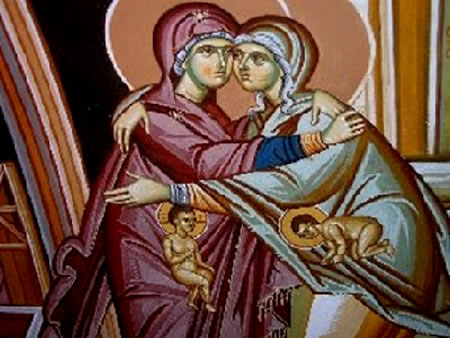 A “Greeting” can be verbal or it can be a handshake or a kiss and embrace. In this case Mary “greeted”, addressed a verbal greeting, which Elizabeth heard. She greeted either with the Greek “Rejoice” or with one of the judaic greetings “Peace be with you” (Judg 19:20) or “The Lord bless you” (Ruth 2:4).
A “Greeting” can be verbal or it can be a handshake or a kiss and embrace. In this case Mary “greeted”, addressed a verbal greeting, which Elizabeth heard. She greeted either with the Greek “Rejoice” or with one of the judaic greetings “Peace be with you” (Judg 19:20) or “The Lord bless you” (Ruth 2:4).
The moment Elizabeth heard her young relative’s greeting and without knowing anything else, she felt the baby moving inside her: “the baby leaped in her womb”. This was not a normal movement of the embryo. Something similar happened to Rebecca but she could not understand what the movements of her embryos meant (see Gen 25:22). Elizabeth, however, “was filled with the Holy Spirit” (cf. verse 15), she was enlightened by the Holy Spirit and she felt this movement as a kind of exultation. Virgin Mary’s meeting with Elizabeth is chanted, in the fifth stanza of the first Stasis of the Akathist Hymn: “The Virgin, bearing God in her womb, hastened to visit Elizabeth, whose own babe at once knowing her greeting, rejoiced and leaping up as if in a song, cried out to the Theotokos”.
1,42. καὶ ἀνεφώνησε φωνῇ μεγάλῃ καὶ εἶπεν· εὐλογημένη σὺ ἐν γυναιξὶ καὶ εὐλογημένος ὁ καρπὸς τῆς κοιλίας σου.
1:42 And she exclaimed with a loud voice, and said, blessed are you among women, and blessed is the fruit of your womb.
The seemingly superfluous repetition of the synonyms “exclaimed” and “a loud voice” expresses emphatically what Elizabeth experienced when she recognized Mary’s grandeur. She was absolutely certain of her divine pregnancy being a fact. Her cry of joy was mixed with awe. Elizabeth’s greeting to virgin Mary was the same with that of the angel: “Blessed are you among women”. It is not a wish to “be blessed” but rather she expressed her conviction that she’s already blessed.
The phrase “and blessed is the fruit of your womb” which is an addition to the angel’s greeting, shows that Elizabeth knew about Mary’s pregnancy by divine revelation. As it was already mentioned, Mary conceived the fruit of her womb the moment she freely consented to God’s plan (see verse 38).
The Church, combining the angel’s greeting with that of Elizabeth’s to Mary, composed one of the finest hymns which is included in the Vesper service of the Lent and in the Artoklasia (The Blessing of the Five Loaves): “Hail, most blessed Mary, Virgin Theotokos, the Lord is with you. Blessed are you among women, and blessed is the fruit of your womb, for you have given birth to the Savior of our souls”.
1,43. Καὶ πόθεν μοι τοῦτο ἵνα ἔλθῃ ἡ μήτηρ τοῦ Κυρίου μου πρός με;
1:43 And how did this happen to me, that the mother of my Lord should come to me?
“And how did this happen to me” expresses the awe Elizabeth felt. She wondered if she had some value or virtue that proved her worthy of such an honourable visit. She knew that the person who came to her house was not a common woman, a simple relative, but the Lord’s mother. Elizabeth called her “mother”, since she was already expecting a baby. Elizabeth respected and venerated her, even though she was older than her, because she realized that virgin Mary would be her Lord’s mother. She would never call Mary “the mother of my Lord” on her own, because only God is the Lord for the Jewish people. The Holy Spirit revealed to her (verse 15), that the expected baby is the God and urged her to this declaration. The way Elizabeth addressed Mary is a testimony that the divine and human nature were both united substantially in Jesus since the moment of conception. The pronoun “my” shows Elizabeth’s intimacy with the God she believed.
1,44. Ἰδοὺ γὰρ ὡς ἐγένετο ἡ φωνὴ τοῦ ἀσπασμοῦ σου εἰς τὰ ὦτά μου, ἐσκίρτησε τὸ βρέφος ἐν ἀγαλλιάσει ἐν τῇ κοιλίᾳ μου.
1:44 For behold, when the voice of your greeting came to my ears, the baby leaped in my womb in exultation.
Elizabeth explained how she recognized Mary to be her Lord’s mother: the baby she carried inside her leaped in exultation.
We cannot explain accurately the phrase “in exultation”. Of course, it means “joy” but, in this case, it denotes something more. It refers to the gladness of the heavenly kingdom. Probably it relates to the Holy Spirit, who in the Ps (45:7) 44:8 is called “the oil of gladness” (cf. Heb 1:9). John was still an unborn baby but he was enlightened by the Holy Spirit to prophesize using his mother’s mouth. In this way the angel’s assurance to Zechariah was fulfilled: “and he will be filled with the Holy Spirit, even from his mother's womb” (verse 15).
1,45. Καὶ μακαρία ἡ πιστεύσασα ὅτι ἔσται τελείωσις τοῖς λελαλημένοις αὐτῇ παρὰ Κυρίου.
1:45 And blessed is she who believed that there would be a fulfilment of what was spoken to her from the Lord.
Elizabeth called Mary “blessed”, which means “happy”, for her faith. In contrast to Zechariah, she entrusted God’s messenger. She believed that “there would be a fulfilment”, everything that the angel told her would be fulfilled. God’s promises would be realized.
1,46. Καὶ εἶπε Μαριάμ· Μεγαλύνει ἡ ψυχή μου τὸν Κύριον.
1:46 And Mary said; My soul magnifies the Lord.
After Elizabeth’s unexpected greeting, virgin Mary burst into a spontaneous doxology and praise. She praised the Lord and prophesized. Her expression reminds us of the Psalms. From a very young age the Jewish children learned to study the Holy Scriptures (see 2 Tim 3:15). The Most Holy Theotokos, being very fond of God’s word, with her intelligence and diligence, had managed to memorize many passages of the Old Testament, especially psalms and odes. In that very special moment, when the wonderful divine project unfolded in front of her, the god-inspired prayers came spontaneously to her lips, the same way she had addressed them to God many times before.
Virgin Mary’s ode is a poem. The ancient Jewish poetry is distinct because there is harmony in the content and not in the syllables. Hence, everyone can spontaneously compose lyrics readily. Moreover, the translation does not alter at all the Jewish poems, since they use verses without rhyme and the same meaning expressed twice in a different way.
It was, therefore, quite simple for virgin Mary to express herself poetically, with no special preparation. It was, also, possible for Luke to translate her poetic words into Greek without altering the content or the poetic grace and style.
This spontaneous and god-inspired poem by virgin Mary has two stanzas. In the first one (verses 46-50) virgin Mary expressed her personal feelings, while in the second one (verses 51-55) she spoke on behalf of the Jewish people. She realized that the divine plan she would serve was both personal and of all the Jewish people or rather of the whole humanity. This was an honour for herself, for the Jewish people and the whole humankind as well. The fact that she spoke in a double identity, both as Mary and as Israel, is the only symmetry between the two stanzas.
Our Church has included virgin Mary’s ode in the worship. It is the ninth ode in the Matins. These verses are chanted before the repeated sweetest praise to God’s Mother: “More honorable than the Cherubim, and beyond compare more glorious than the Ser-aphim, incorruptibly you gave birth to God the Word. We magnify you, the true Theotokos”.
The pious Jewish people were accustomed to use the expression "My soul magnifies the Lord”, to worship God (see 2 Sam 7:26, Pss (34:3) 33:4; (40:16) 39:17; (69:30) 68:31; (70:4) 69:5). God, of course, is absolutely great and glorious. When the human soul worships Him, it does not add anything to His greatness and glory but admits and declares, lives and announces His magnificence.
1,47. καὶ ἠγαλλίασε τὸ πνεῦμά μου ἐπὶ τῷ Θεῷ τῷ σωτῆρί μου.
1:47 And my spirit has exulted in God my Saviour.
Virgin Mary stunned by God’s glory and magnificence, felt the need to express the exultation she felt deep inside her. The angel’s visit made her rejoice excessively, because she was assured in the most convincing and tangible way that God was her saviour (cf. Hab 3:18). He is not only the almighty Lord who created and rules the universe, but also the God whose love caused him to enter the human history, to visit his creatures in order to save them. It is obvious that virgin Mary herself as Adam’s descendant inherited the original sin and was in need of salvation. This verse disproves the fallacy of the Catholics “immaculata conceptio” that Virgin Mary did not have the original sin all humans are born with.
1,48. ὅτι ἐπέβλεψεν ἐπὶ τὴν ταπείνωσιν τῆς δούλης αὐτοῦ. Ἰδοὺ γὰρ ἀπὸ τοῦ νῦν μακαριοῦσί με πᾶσαι αἱ γενεαί.
1:48 For he has kept an eye on the low estate of his servant with affection. For, behold, from this time forward all generations will call me blessed.
The phrase “has kept an eye on” often occurs in the Holy Scriptures and especially in the Psalms. It means that God casts His affectionate and favourable glance to humans. Mary explained the reason of her extreme joy, which urged her heart to praise. The Most High Lord condescended to cast an eye full of affection and love to His worthless servant. She did not believe that she won God’s favour because of her virtue and qualities. She called herself a servant even though she heard the angel’s unique greeting, Elizabeth’s impressive praise and she was going to bear God who transcends the universe. This humility, indeed, was that attracted God to cast His eye on her. Humility is the beauty that moves and pleases God and wins His favour (see Is 66:2). The book of Proverbs stresses that “God resists the proud, but gives grace to the humble” (Prov 3:34; cf. Jas 4:6; 1 Pet 5:5). The Holy Fathers strongly emphasize the humility of virgin Mary. They teach that due to this, she attracted God’s grace and blessing. Humility is the basis of all spiritual life, the very first step to heaven.
The obscure girl of Nazareth being conscious of the highest mission that God entrusted her with, prophesized that people would glorify her throughout the centuries. “For, behold, from this time forward all generations will call me blessed”. Her prophecy had already started to be fulfilled when Elizabeth called her “blessed” (verse 45). During Jesus’ life on earth there was another fulfillment of this prophecy. When an unknown woman listened to Christ’s teaching, she expressed herself enthusiastically, “Blessed is the womb that bore you, and the breasts that you sucked” (Lk 11:27). Today the name of virgin Mary is the most praised in the whole Orthodox world. The faithful express their piety towards her in many ways. They have deep respect and love for her in their hearts and ask for her help. There are churches dedicated to the Most Holy Mother all over our country. There are even more small churches and shrines which constantly remind us of her close connection to our people’s soul. The genuine piety generously offered her hundreds of other names, as tokens of her live presence: Pantanassa, Glikofilousa, Megalochari, Giatrissa, Gorgoepekoos, Eleousa, Skepi, The Champion General and many others each one reflecting a unique story of faith. Mount Athos, finally, this place which sanctifies people’s souls and is a stronghold of Orthodoxy, was established as the Garden of virgin Mary and treasures a multitude of icons and historic churches dedicated to her.
1,49-50. ὅτι ἐποίησέ μοι μεγαλεῖα ὁ δυνατὸς καὶ ἅγιον τὸ ὄνομα αὐτοῦ, καὶ τὸ ἔλεος αὐτοῦ εἰς γενεὰς γενεῶν τοῖς φοβουμένοις αὐτόν.
1:49-50 Because he who is mighty has done great things for me, and holy is his name. And his mercy is on those who fear him from generation to generation.
Virgin Mary astounded by the miracle she experienced, she declared that God is powerful, “he who is mighty has done great things for me” and holy, “holy is his name” and merciful “his mercy is on those who fear him from generation to generation”. It would be natural for almighty God to abhor weak and sinful people. However, his mercy came up with a magnificent plan to save and sanctify humanity. Saint Athanasios briefly states: “The Word became flesh” (Jn 1:14) so that men will be able to appropriate divinity. This concise phrase encloses the whole theology concerning the purpose of God’s incarnation, which is man’s theosis. Mary was aware of all these miraculous events, while she saw God’s plan realizing and felt God’s mercy permeating Her like a flood. Undoubtedly, opulent God could not have given a more generous charity to a poor person than that he offered to virgin Mary: He appointed her to be his mother.
1,51-53. Ἐποίησε κράτος ἐν βραχίονι αὐτοῦ, διεσκόρπισεν ὑπερηφάνους διανοίᾳ καρδίας αὐτῶν· καθεῖλε δυνάστας ἀπὸ θρόνων καὶ ὕψωσε ταπεινούς, πεινῶντας ἐνέπλησεν ἀγαθῶν καὶ πλουτοῦντας ἐξαπέστειλε κενούς.
1:51-53 He has performed mighty deeds with his arm; he has scattered those who were haughty in the thoughts of their hearts. He has brought down rulers from their thrones but has lifted up the humble. He has filled the hungry with fortune but has sent the rich empty-handed away.
In the Bible the expression “with his arm” signifies God’s power but also his incarnation. Much like the phrase “God’s name” denotes the entity of God, God himself (see verse 49), so “God’s arm” is a prophetic saying about the incarnated God, Jesus Christ, who is of one essence with the Father. With his arm, with his Son’s incarnation, God “performed mighty deeds”, established his mighty Kingdom, the Church, and showed his great power. The expected Redeemer of Israel and Savior of the world “has scattered those who were haughty in the thoughts of their hearts”.
He crushed all those who arrogantly rebelled against God. This includes Lucifer, who was the first to stand with pride and wanted to establish his own kingdom, but also the so-called "world rulers", who, following the set example and the instructions of the “prince” of this world (see John 12:31, 14:30, 16:11), claim to be surrounded by divine honours.
The tense of the verbs in these verses is the prophetic past, used in the prophetic texts instead of the future. The prophets, being absolutely sure of the fulfillment of their prophecies, used the past simple, as if the fact they were prophesying had already happened. After all, enlightened by the Holy Spirit, they saw the future as present and were already living the prophecies fulfilled in their time (see Jn 8:56). And the virgin Mary, enlightened by the Holy Spirit and by the par excellence "Anointed", whom she bore in her womb, described in her ode the events of the future.
In a laudatory sermon, which is attributed to St. Gregory the Miracle Worker, a comparison is made between the words of Elizabeth and the virgin Mary. «We see that the words of the barren are brilliant; however, the words of the Holy Virgin are even more brilliant; and they sing an ode to God full of thanksgiving and fragrance and theology: announcing the new along with the old ones: preaching what happened centuries ago and what will happen until the end of the world and briefly summing up the mysteries of Christ”.
Even, from the admirable history of Israel the virgin Mary knew of incidents where powerful proud rulers were overthrown and humiliated by divine intervention, while humble and despised men rose and took power. Where did Saul end up? What befell upon Jezebel? Where was the fallen Nebuchadnezzar found? From which prison was Joseph raised to the throne of Egypt? From which swamp of the Nile did the exposed baby, Moses, rise? From which pasture of Bethlehem did David emerge? And now, from the crushed Israel, from the poor Virgin, will come the eternal leader of mankind, the Redeemer of the world.
The examples of verses 52 and 53 analyze the meaning of the previous verse (51) and delve into it. The hungry literally swam in a wealth of goods and the rich were chased away empty-handed, without even receiving a single piece of bread. The paradoxical reversal of situations occurs in both the political and social spheres. But also in the spiritual life, the more the believer feels his poverty, his inadequacy and the need of God, the richer he becomes (see Mt 5:3). Whoever proudly, like the angel of the church of Laodicea, says “‘I am rich; I have acquired wealth and do not need anything” (see Rev 3:17), relying on his self-confidence, he is led to arrogance and thus stays away from God.
1,54-55. Ἀντελάβετο Ἰσραὴλ παιδὸς αὐτοῦ μνησθῆναι ἐλέους, καθὼς ἐλάλησε πρὸς τοὺς πατέρας ἡμῶν, τῷ Ἀβραὰμ καὶ τῷ σπέρματι αὐτοῦ εἰς τὸν αἰῶνα.
1:54-55. He has helped his servant Israel, remembering to be merciful to Abraham and his descendants forever, just as he promised our ancestors.
God “helped his servant Israel”, He stretched out His divine hand and helped his servant Israel at the most critical time, when the world had reached the end of the outmost point of rebellion and corruption (see Rom 1:18-32), but Judaism had also become an empty formalism (see Rom 2:17-29). Just then God “with His arm” (verse 51) with His incarnation grabbed man and saved him from certain doom.
“Remembering” is a human expression used for God, as if it were possible for God to forget. As soon as the virgin Mary appeared in the history of mankind, the Lord proved that He did not forget the promises He had made (see Gen 22:16-18). He generously offered His help and mercy “to Abraham and his descendants”, that is, to Israel, and in fact to the new and eternal Israel, which is descended from Abraham by faith (see Rom 4:13-17, Gal 3:7).
1,56. ῎Εμεινε δὲ Μαριὰμ σὺν αὐτῇ ὡσεὶ μῆνας τρεῖς καὶ ὑπέστρεψεν εἰς τὸν οἶκον αὐτῆς.
1:56. Mary stayed with Elizabeth for about three months and then returned home.
After a three-month stay with Elizabeth, who was in the ninth month of her pregnancy and the time of her childbirth was approaching, the Virgin returned to her homeland, Nazareth.
Copyright © 2021 by Orthodox Christian Association «ΧΡΙΣΤΙΑΝΙΚΗ ΕΛΠΙΣ» ΟΡΘΟΔΟΞΗ ΑΔΕΛΦΟΤΗΤΑ. Used by permission. All rights reserved.
